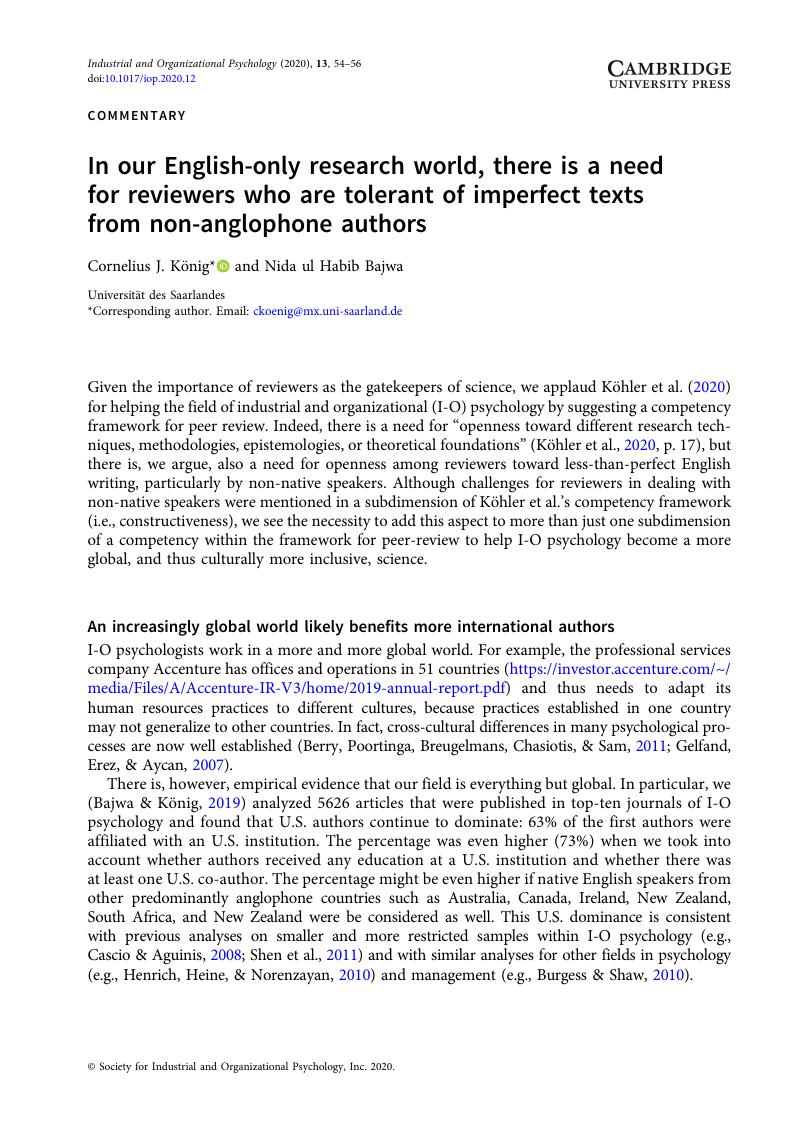No CrossRef data available.
Article contents
In our English-only research world, there is a need for reviewers who are tolerant of imperfect texts from non-anglophone authors
Published online by Cambridge University Press: 01 May 2020
Abstract
An abstract is not available for this content so a preview has been provided. Please use the Get access link above for information on how to access this content.

- Type
- Commentaries
- Information
- Copyright
- © Society for Industrial and Organizational Psychology, Inc. 2020
References
Bajwa, N. ul H., & König, C. J. (2019). How much is research in the top journals of industrial/organizational psychology dominated by authors from the U.S.? Scientometrics, 120, 1147–1161. doi: 10.1007/s11192-019-03180-2CrossRefGoogle Scholar
Bajwa, N. ul H., König, C. J., & Harrison, O. S. V. (2016). Toward evidence-based writing advice: Using applied linguistics to understand reviewers’ expectations. Academy of Management Learning & Education, 15, 419–434. doi: 10.5465/amle.2015.0002CrossRefGoogle Scholar
Bajwa, N. ul H., Langer, M., König, C. J., & Honecker, H. (2019). What might get published in management and applied psychology? Experimentally manipulating implicit expectations of reviewers regarding hedges. Scientometrics, 120, 1351–1371. doi: 10.1007/s11192-019-03164-2CrossRefGoogle Scholar
Belcher, D. D. (2007). Seeking acceptance in an English-only research world. Journal of Second Language Writing, 16, 1–22. doi: 10.1016/j.jslw.2006.12.001CrossRefGoogle Scholar
Berry, J. W., Poortinga, Y. H., Breugelmans, S. M., Chasiotis, A., & Sam, D. L. (2011). Cross-cultural psychology: Research and applications (3rd ed.). Cambridge, UK: Cambridge University Press.CrossRefGoogle Scholar
Boussebaa, M., & Tienari, J. (in press). Englishization and the politics of knowledge production in management studies. Journal of Management Inquiry. doi: 10.1177/1056492619835314Google Scholar
Burgess, T. F., & Shaw, N. E. (2010). Editorial board membership of management and business Journals: A social network analysis study of the Financial Times 40. British Journal of Management, 21, 627–648. doi: 10.1111/j.1467-8551.2010.00701.xCrossRefGoogle Scholar
Cascio, W. F., & Aguinis, H. (2008). Industrial and organizational psychology 1963–2007: Changes, choices, and trends. Journal of Applied Psychology, 93, 1062–1081. doi: 10.1037/0021-9010.93.5.1062CrossRefGoogle Scholar
Gelfand, M. J., Erez, M., & Aycan, Z. (2007). Cross-cultural organizational behavior. Annual Review of Psychology, 58,
479–514. doi: 10.1146/annurev.psych.58.110405.085559CrossRefGoogle ScholarPubMed
Happell, B. (2011). Responding to reviewers’ comments as part of writing for publication. Nurse Researcher, 18(4), 23–27. doi: 10.7748/nr2011.07.18.4.23.c8632CrossRefGoogle ScholarPubMed
Henrich, J., Heine, S. J., & Norenzayan, A. (2010). The weirdest people in the world? Behavioral and Brain Sciences, 33,
61–83. doi: 10.1017/S0140525X0999152XCrossRefGoogle Scholar
Hyland, K. (2002). Genre: Language, context, and literacy. Annual Review of Applied Linguistics, 22, 113–135. doi: 10.1017/S0267190502000065CrossRefGoogle Scholar
Köhler, T., González-Morales, M. G., Banks, G. C., O’Boyle, E., Allen, J. A., Sinha, R., … Gulick, L. M. V. (2020). Supporting robust, rigorous, and reliable reviewing as the cornerstone of our profession: Introducing a competency framework for peer review. Industrial and Organizational Psychology: Perspectives on Science and Practice, 13(1), 1–27.CrossRefGoogle Scholar
Liu, L. A. (2014). Addressing reviewer comments as an integrative negotiation. Management and Organization Review, 10, 183–190. doi: 10.1111/more.12061CrossRefGoogle Scholar
Martín, P., Rey-Rocha, J., Burgess, S., & Moreno, A. I. (2014). Publishing research in English-language journals: Attitudes, strategies and difficulties of multilingual scholars of medicine. Journal of English for Academic Purposes, 16, 57–67. doi:
10.1016/j.jeap.2014.08.001CrossRefGoogle Scholar
Paltridge, B. (2015). Referees’ comments on submissions to peer-reviewed journals: When is a suggestion not a suggestion? Studies in Higher Education, 40, 106–122. doi: 10.1080/03075079.2013.818641CrossRefGoogle Scholar
Politzer-Ahles, S., Holliday, J. J., Girolamo, T., Spychalska, M., & Berkson, K. H. (2016). Is linguistic injustice a myth? A response to Hyland (2016). Journal of Second Language Writing, 34, 3–8. doi: 10.1016/j.jslw.2016.09.003CrossRefGoogle Scholar
Salager-Meyer, F. (1994). Hedges and textual communicative function in medical English written discourse. English for Specific Purposes, 13, 149–170. doi: 10.1016/0889-4906(94)90013-2CrossRefGoogle Scholar
Shen, W., Kiger, T. B., Davies, S. E., Rasch, R. L., Simon, K. M., & Ones, D. S. (2011). Samples in applied psychology: Over a decade of research in review. Journal of Applied Psychology, 96, 1055–1064. doi: 10.1037/a0023322CrossRefGoogle Scholar
Strauss, P. (2019). Shakespeare and the English poets: The influence of native speaking English reviewers on the acceptance of journal articles. Publications, 7(1), 20. doi: 10.3390/publications7010020CrossRefGoogle Scholar
Tourish, D. (in press). The triumph of nonsense in management studies. Academy of Management Learning & Education. doi: 10.5465/amle.2019.0255Google Scholar


